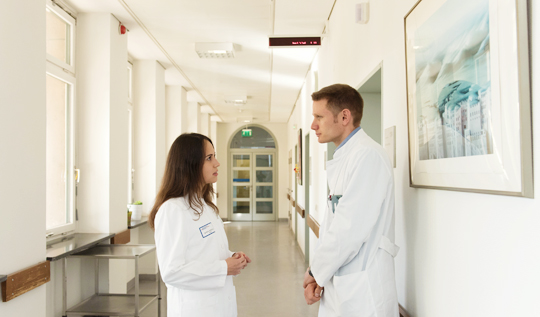Time for research
Freiburg, Nov 27, 2017
A year ago the Faculty of Medicine, together with the University Medical Center Freiburg, started the “Berta Ottenstein Program for Clinician Scientists”. It promotes future medical doctors who have decided to embark on a career as a clinician scientist. These researcher doctors are pursuing both a clinical and scientific career at the same time.

Great team: Robert Zeiser is involved in the Berta Ottenstein program as a mentor for Petya Apostolova who is striving for a career as clinical scientist. Photo: Patrick Seeger
The path of a clinician scientist can be bumpy: as a rule scientific training happens along with their medical residency. As a result, young doctors often don’t have enough time to pursue their own research. However, since 2016 the three-year Berta Ottenstein Program has provided the opportunity for an optimal start to a career as clinician scientist. Prof. Dr. Robert Thimme, together with the program’s spokesperson Prof. Dr. Leena Bruckner-Tuderman, reports: “We are currently funding 14 doctors and we have already seen that it is working. The participants are very enthusiastic and are using the chance to establish themselves in the area of research.”
A team for every participant
The future clinician scientists have completed their doctoral degree and have either not yet started or have completed their post-doc phase in which they spend time in a research lab. They all have the best support. Each participant gets his or her own individual team consisting of one scientific and one clinically active mentor, a medical director of the respective hospital as well as representatives from the Berta Ottenstein program and the accompanying qualification program.
“Especially after returning from the post-doc phase and entering the every day at the hospital, people run the risk of losing their acquired scientific abilities,” says Prof. Dr. Robert Zeiser, scientific mentor in the Berta Ottenstein program. “Due to clinical responsibilities, people often have no time to put together a research team and develop innovative research methodologies.”
The first and perhaps most important pillar of the program is therefore creating the necessary time for the young doctors. “The program has been designed such that half of the three years is spend doing research,” explains the program coordinator Dr. Irene Nagel-Jachmann. “The way they manage their time is decided individually, whether it’s in blocks or day by day. The important thing is that they spend roughly half their time doing either activity.” It is clearly stipulated in their contracts as to when the intern’s time during his residency is spent at the hospital or on his or her own research.
“That is an enormous advantage compared to all the other measures we have had before now. In my view as a mentor, I would say it works really well,” reports Zeiser. “As a doctor, I see that the clear benefit is being able to stand at the patient’s bed while still transferring clinical knowledge directly into research and back again. I think a lot of special medical fields rely on this kind of knowledge transfer,” adds Dr. Petya Apostolova, a Berta Ottenstein program participant.
Seminars, Retreat, Symposium
Along with the three-year training program there are monthly seminars in which the participants report on their work progress while having the opportunity to discuss amongst themselves and their mentors. Once a year, the participants also organize their own two-day retreat where they present their research progress and have an opportunity to exchange ideas with one another and invited experts about their work, but also about issues relevant to their careers, such as obtaining third-party funds or reconciling work and family life.
Every two years the participants also organize a scientific symposium. “Exchanging ideas with the other participants is extremely rewarding. Besides it’s a great chance for young scientists to network,” says Apostolova. Furthermore, the program includes courses and workshops in the fields of medical-scientific qualification and key qualifications, in line with the profession of clinician scientist. Examples include courses on time and self-management, biostatistics or effective experimental design.
Requirements for applicants
For those who wish to participant in the Berta Ottenstein program should have graduated with very good grades, have completed his or her doctoral degree with at least “magna cum laude”, be in the residency phase and have not yet received his or her habilitation. Furthermore those interested should be able to provide evidence of their scientific approval through published papers as well as be able to provide promising project outlines. Applying for the program is recommended after the first half-year of residency so that applicants have already obtained a solid foundation in clinical training.
“The participants are very motivated and utilize the various program offerings,” reports Thimme. “We are so happy to see how they are developing as researchers, pushing their projects forward with great enthusiasm and building important collaborations.”
www.med.uni-freiburg.de/de/forschung/clinician-scientists-programm
Lars Kirchberg

